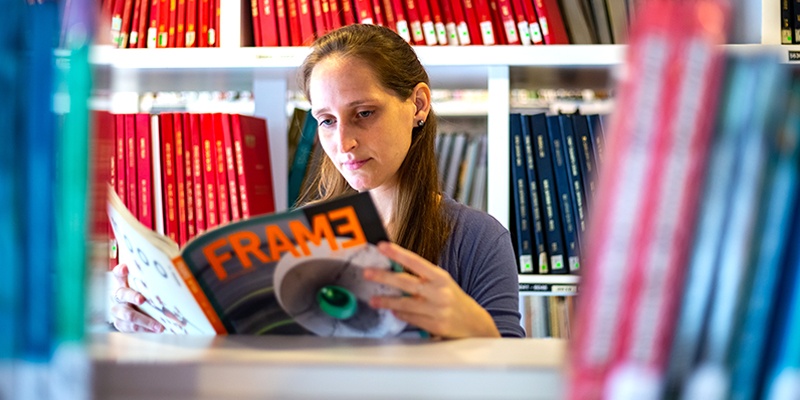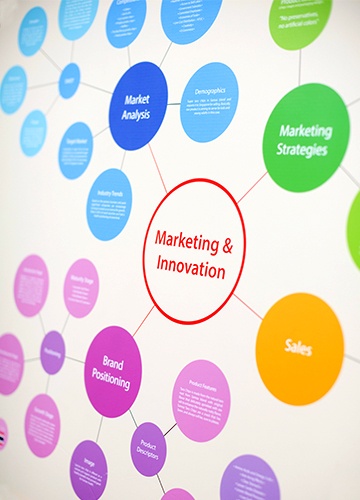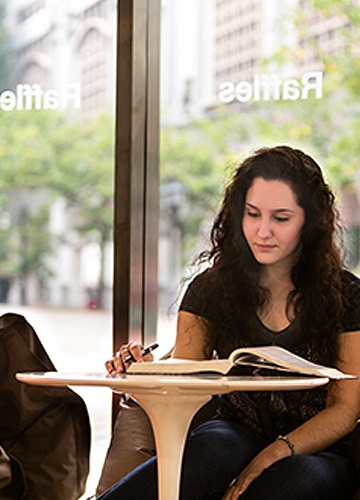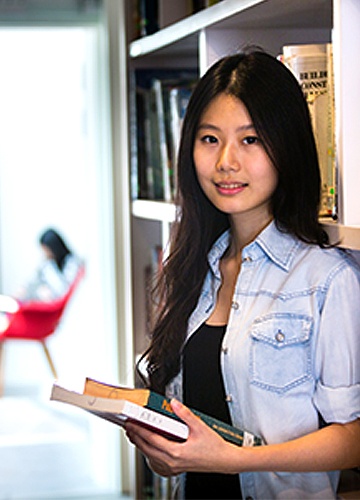Programme Overview
Cambridge IGCSE® is the world’s most popular international qualification, which is recognised globally by leading universities and employers, and is tried, tested, and trusted by schools worldwide. At Raffles College of Higher Education (RCHE), we lay the foundation for your design education with IGCSE subjects hand-picked to complement your artistic and entrepreneurial passions, giving you an early head start in your field of interest.
This is a unique IGCSE preparatory course that have been carefully curated to provide a smooth transition into RCHE’s Design and Business Diploma programmes.

Duration:
24 Months*
Mode:
Full-Time
Programme Details:
Cambridge IGCSE® is the world’s most popular international qualification, which is recognised globally by leading universities and employers, and is tried, tested, and trusted by schools worldwide. At Raffles College of Higher Education, we lay the foundation for your design education with IGCSE subjects hand-picked to complement your artistic and entrepreneurial passions, giving you an early head start in your field of interest.
*Note:
- Recognised Prior Learning: When you apply for IGCSE, the College will assess your prior learning. Contact us to find out more.
- 4 IGCSE passes of 'D' or above (excluding English) are required to progress to Diploma.
Find out about the exciting subjects and topics you will be covering while embarking on your success by design! Download the course module descriptors for further information.
| |||||||||||||||||||||||||||||||||||||||||||||||||||||||
Alternative subjects offered in the event the preferred subjects are unavailable. | |||||||||||||||||||||||||||||||||||||||||||||||||||||||
View full course modules here.
 | Awarded by: Cambridge Assessment International Education (CAIE) Intake: January and July Duration: 24 Months (Full-time) |
| Minimum Entry Requirements: |
|
| Payment Option 1 | |||||||
|---|---|---|---|---|---|---|---|
| Term | 1 | 2 | 3 | 4 | Total Fees | ||
| Date of Payment | 1st Instalment due upon signing Standard Student Contract | 2nd Instalment due 1 week before the 1st of the following months: January, April, July and October | |||||
International Applicant | $10,900 | $10,900 | $21,800 | ||||
Singaporean & PR | $5,450 | $5,450 | $10,900 | ||||
| Payment Option 2 | |||||||
|---|---|---|---|---|---|---|---|
| Term | 1 | 2 | 3 | 4 | Total Fees | ||
| Date of Payment | 1st Instalment due upon signing Standard Student Contract | 2nd Instalment due 1 week before the 1st of the following months: January, April, July and October | |||||
International Applicant | $21,091.501 | $21,091.501 | |||||
| Singaporean & PR | $10,518.50 | $10,518.501 | |||||
- 1Instant rebate will be applicable to yearly payment of course fees.
- Course Fees listed are in Singapore Dollars (SGD)
- Prevailing Goods and Services Tax (GST) is included in the prices shown
- Each semester is six (6) months and each term is three (3) months.
- The dates of payment are subject to change by the Any change will be communicated to all students.
*S$218 will be charged for the respective levels for course material
For many students, education loans are essential to pay for university and obtain a degree. We are pleased to inform you that Raffles College Of Higher Education is one of the approved institutions for POSB's Further Study Assist. Applicable for Singaporeans and Permanent Residents only.
If you require any assistance in education loans, feel free to speak with our team of education consultants.
-
INTERNATIONAL GENERAL CERTIFICATE OF SECONDARY EDUCATION
- Course Introduction
Duration:
24 Months*Mode:
Full-TimeProgramme Details:
Cambridge IGCSE® is the world’s most popular international qualification, which is recognised globally by leading universities and employers, and is tried, tested, and trusted by schools worldwide. At Raffles College of Higher Education, we lay the foundation for your design education with IGCSE subjects hand-picked to complement your artistic and entrepreneurial passions, giving you an early head start in your field of interest.
*Note:
- Recognised Prior Learning: When you apply for IGCSE, the College will assess your prior learning. Contact us to find out more.
- 4 IGCSE passes of 'D' or above (excluding English) are required to progress to Diploma.
Course ModuleFind out about the exciting subjects and topics you will be covering while embarking on your success by design! Download the course module descriptors for further information.
Art & Design This subject aims to encourage a personal response by stimulating imagination, sensitivity, conceptual thinking, powers of observation, and analytical ability. Students gain confidence and enthusiasm as they develop technical skills in 2D and 3D form and composition, identify and solve problems in visual and tactile forms, and develop a greater awareness of the role played by the visual arts in society and in history, broadening cultural horizons and individual experience. Design & Technology This subject enables students to identify, consider, and solve problems through creative thinking, planning and design, and by working with different media, materials, and tools. Students gain greater technical and design awareness, while developing skills such as initiative, resourcefulness, enquiry, and ingenuity, preparing them for their future within a rapidly changing technological society. Enterprise This subject brings the world of business into the classroom and gives students a clear insight into what it means to think like an entrepreneur, asking students to adopt the thoughts and actions of entrepreneurs, developing their knowledge and understanding of the practicalities of setting up and running their own new enterprise. Business Studies This subject develops students' understanding of business activity in the public and private sectors, and the importance of innovation and change. Students find out how the major types of business organisation are established, financed and run, and how their activities are regulated. Factors influencing business decision-making are also considered, as are the essential values of cooperation and interdependence. Business The Business syllabus introduces learners to the terminology and concepts used in business. It explores different business structures and the influence of key internal and external stakeholder groups, to gain an insight into business decision-making, develops learners’ numeracy skills through interpreting and analysing business data and information, and also develops learners’ awareness of sustainability and environmental issues within business, both locally and globally. English – First Language This subject is designed for students whose first language is English. The course enables students to develop the ability to communicate clearly, accurately and effectively when speaking and writing; use a wide range of vocabulary, and the correct grammar, spelling and punctuation; and develop a personal style and an awareness of the audience being addressed. English as a Second Language (Count-in speaking) This subject is designed for students who already have a working knowledge of the language and who want to consolidate their understanding in order to progress in their education or career. The aim is to achieve a level of practical communication ideal for everyday use, which can also form the basis for further, more in-depth language study. In Syllabus 0511, the marks for the speaking component contribute to the overall grade. English as a Second Language (Speaking endorsement)
This subject is designed for students who already have a working knowledge of the language and who want to consolidate their understanding in order to progress in their education or career. The aim is to achieve a level of practical communication ideal for everyday use, which can also form the basis for further, more in-depth language study. In Syllabus 0510, the marks for the speaking component do not contribute to the overall grade. Mathematics This subject encourages the development of mathematical knowledge as a key life skill and aims to build students' confidence by helping them develop competence and fluency with mathematical concepts, methods and skills, as well as a feel for numbers, patterns and relationships, with strong emphasis on solving problems and presenting and interpreting results. Students gain an understanding of how to communicate and reason using mathematical concepts. Mathematics – Additional Additional Mathematics encourages learners to further develop their mathematical ability in problem solving. The syllabus requires a fluent and confident ability to solve problems in abstract mathematics, enriches learners understanding of connections within mathematics, refining learners’ reasoning and analytical skills, and reinforces learners' competency, confidence, and fluency in their use of techniques with and without a calculator, strengthening mathematical understanding and communication skills. Biology This subject helps learners to understand the biological world in which they live and take an informed interest in science and scientific developments. The syllabus includes the basic principles and concepts that are fundamental to the subject, some current applications of biology, and some practical skills. Chemistry This subject helps learners to understand the technological world in which they live and take an informed interest in science and scientific developments. The syllabus includes the basic principles and concepts that are fundamental to the subject, some current applications of chemistry, and some practical skills Physics This subject helps learners to understand the technological world in which they live and take an informed interest in science and scientific developments. The syllabus includes the basic principles and concepts that are fundamental to the subject, some current applications of physics, and some practical skills Science – Combined Combined Science gives learners the opportunity to study Biology, Chemistry and Physics, each covered in separate syllabus sections. It is a single award qualification, earning one grade. The syllabus helps includes the basic principles and concepts that are fundamental to science, some current applications of biology, chemistry and physics, and some practical skills. Computer Science Computer Science helps learners develop an interest in computational thinking and an understanding of the principles of problem-solving using computers. They apply this understanding to create computer-based solutions to problems using algorithms and a high-level programming language. Learners also develop a range of technical skills, and the ability to effectively test and evaluate computing solutions. Geography The Geography syllabus focuses equally on physical and human topics, with skills being embedded to encourage a more holistic approach to the subject. It includes contemporary and relevant topics which encourage learners to recognise the opportunities and challenges of our changing world and develop an awareness of how the study of geography can help us understand and manage environmental, social and economic issues. Global Perspectives Meeting government ministers, organising a local river clean-up project, or writing to the United Nations about climate change, are just some of the activities students might find themselves pursuing through this subject. It is both cross-curricular and skills-based, with emphasis on developing the ability to think critically about a range of global issues where there is always more than one point of view. Accounting The Accounting syllabus explores the purpose and role of accounting for businesses, individuals and non-trading organisations and the impact on society as a whole. It introduces learners to the techniques, procedures and key accounting terms and concepts of accounting, develops learners’ numeracy and literacy skills as well as how to record, report, present and interpret financial information, and also develops learners’ awareness of ethical considerations, technological factors and sustainability and how these impact accountants and business owners in the current world of accounting. Economics The Economics syllabus introduces learners to economic terminology, concepts and principles. It develops learners’ skills in working with simple economic data to analyse and interpret information, as well as to organise and present ideas, explores the tools of economic analysis and evaluation, understanding links and relationships between variables, and how economies are affected by issues such as population change, environmental sustainability and globalisation. Environmental Management The Environmental Management syllabus encourages learners to gain an interest in environmental issues that affect the individual, the community and the wider world. It develops understanding of scientific data and evidence to solve problems and make decisions, enables learners to gain an understanding of climate change and have the knowledge and skills required to address climate-related challenges at local, national and global levels, and develops learners’ interest in environmental management through the discovery of strategies, their impacts and ability to manage climate change that could inspire further study. Travel and Tourism This subject is designed to introduce learners to this rapidly diversifying industry. It provides an understanding of the nature of travel and tourism globally, nationally and locally, develops the concepts, models and theories used within the industry, and highlights the importance of sustainability, resilience, the customer, destinations and marketing in travel and tourism. Fashion and Textiles Students of this subject cover a range of topics including use of textiles, style and choice of clothing, use of patterns, fitting and assembling garments, and how to care for clothing. The aim is to develop students' creative and aesthetic awareness, stimulating an enjoyment in the creative use of textiles. Through their studies, students also develop a discriminating and informed approach to the marketing of clothes, learning how to assess suitability and recognise quality, in the context of fashion and textiles. Chinese – First Language This syllabus is designed for learners whose first language is Chinese. It develops learners' ability to communicate clearly, accurately and effectively. They learn how to employ a wide-ranging vocabulary, use correct grammar, spelling and punctuation, and develop a personal style and an awareness of the audience being addressed. Learners are also encouraged to read widely, both for their own enjoyment and in order to develop an appreciation of how writers achieve their effects. French – Foreign Language This syllabus is designed for students who are learning French as a foreign language. The aim is to develop an ability to use the language effectively for practical communication. The course is based on the linked language skills of listening, reading, speaking and writing, and these are built on as learners progress through their studies. The syllabus also aims to offer insights into the culture of countries where French is spoken, thus encouraging positive attitudes towards language learning and towards speakers of other languages. Japanese – Foreign Language This syllabus is designed for learners who are learning Japanese as a foreign language. It develops learners’ ability to use the language effectively for practical communication. The course is based on the linked language skills of listening, reading, speaking and writing, and these are built upon as learners progress through their studies. The course also provides insights into the culture of countries where Japanese is spoken, encouraging positive attitudes towards language learning and towards speakers of other languages. Malay – Foreign Language This syllabus is designed for students who are learning Malay as a foreign language. The aim is to develop an ability to use the language effectively for practical communication. The course is based on the linked language skills of listening, reading, speaking and writing, and these are built on as learners progress through their studies. The syllabus also aims to offer insights into the culture of countries where Malay is spoken, thus encouraging positive attitudes towards language learning and towards speakers of other languages. Bahasa Indonesia This subject is for learners for whom Bahasa Indonesia is a language of everyday use. Learners develop practical communication skills in reading, writing and speaking Bahasa Indonesia in everyday situations. Learners will be able to communicate facts and express their viewpoints with a degree of accuracy and clarity, in spoken and written form. They will have the opportunity to respond knowledgably to a range of texts and use these texts to inform and inspire their own writing. The course of study is built around real-life topics such as home life, food, health, school, work, hobbies, travel and current affairs.
Alternative subjects offered in the event the preferred subjects are unavailable.
View full course modules here.
Awarding Body
Awarded by: Cambridge Assessment International Education (CAIE)
Intake: January and July
Duration: 24 Months (Full-time)Minimum Entry RequirementMinimum Entry Requirements: - IELTS 4.5 or equivalent.
- Completed Year 9 or equivalent.
- The minimum age requirement is 15-years of age.
Course FeePayment Option 1 Term 1 2 3 4 Total Fees Date of Payment 1st Instalment due upon signing Standard Student Contract2nd Instalment due 1 week before the 1st of the following months: January, April, July and OctoberInternationalApplicant$10,900$10,900$21,800Singaporean & PR$5,450$5,450$10,900Payment Option 2 Term 1 2 3 4 Total Fees Date of Payment 1st Instalment due upon signing Standard Student Contract 2nd Instalment due 1 week before the 1st of the following months: January, April, July and OctoberInternationalApplicant$21,091.501$21,091.501Singaporean & PR $10,518.50$10,518.501- 1Instant rebate will be applicable to yearly payment of course fees.
- Course Fees listed are in Singapore Dollars (SGD)
- Prevailing Goods and Services Tax (GST) is included in the prices shown
- Each semester is six (6) months and each term is three (3) months.
- The dates of payment are subject to change by the Any change will be communicated to all students.
*S$218 will be charged for the respective levels for course material
For many students, education loans are essential to pay for university and obtain a degree. We are pleased to inform you that Raffles College Of Higher Education is one of the approved institutions for POSB's Further Study Assist. Applicable for Singaporeans and Permanent Residents only.
If you require any assistance in education loans, feel free to speak with our team of education consultants.
Testimonials

YUAN Yuji
Bachelor of Arts in Illustration & Animation (Class of 2020)
YUAN Yuji
I am very happy to have been able to come to Raffles Design Institute. I have gained knowledge and made friends here. The lecturers are great, sharing their knowledge and experience in design. Reflecting on the whole journey, I started from the very beginning level and now I can design by myself; this process really makes me excited.




